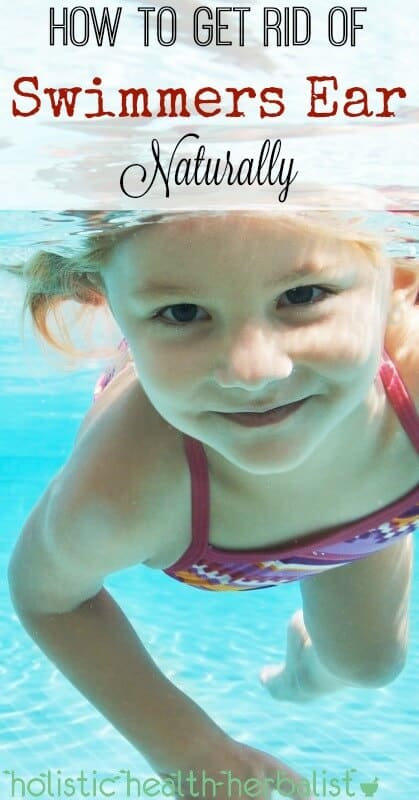Summer is in full swing and the beaches and swimming pools invite you to put on a swimsuit and dive in.
Diving into a refreshing pool is one of the best things to cool off in the summer heat, but you know what isn’t one of the best things? Getting an ear infection, or more specifically, swimmer’s ear!
What is swimmer’s ear?
Swimmer’s ear is a bacterial infection in the outer ear caused by swimming or prolonged exposure to water.
The water becomes trapped in the ear, creating the perfect environment for bacteria to grow and multiply. Water from pools, lakes, streams and other sources can contain these types of bacteria.
Although it may be difficult at first to determine whether or not you have an inner ear infection, middle ear infection, or outer ear infection, visible redness, swelling, and itching in and around the ear can help you determine which type of infection is present. .
And if the affected person has been swimming recently, this is probably a good indication that he has swimmer’s ear!
Some common facts about swimmer’s ear
• Overexposure to water is the leading cause of swimmer’s ear
• External otitis (also called swimmer’s ear) is usually a bacterial skin infection of the outer ear canal.
• Makes hearing difficult
• Pain when pressure is applied to the outer ear (such as when lying down)
• Proper treatment emphasizes avoiding exposure to water
• Proper ear care can often prevent swimmer’s ears
• Swimmer’s ear can be acute or chronic in nature
• Symptoms include swelling, drainage, pain, itching and a feeling of fullness in the ear that is visible in/around the ear
There are a few ways to get rid of swimmer’s ear naturally. The great thing about these swimmer’s ear remedies is that they are super easy to do and they are effective!
I have personally used these methods to relieve a serious ear infection I got while boogie boarding last year. The waves were huge and powerful enough to shoot water into my inner ear. No matter how hard I tried, the water inside wouldn’t budge, so naturally I ended up with a rather uncomfortable case of swimmer’s ear.
The best remedies to get rid of swimmer’s ear naturally
First and foremost, the question everyone has: How do you get water out of your ears most efficiently?
This CAN be a little tricky, so here are a few tips to help drain the water from the ear.
Is there water in your ears? Here’s what to try first!
1. Use the vacuum method/vacuum technique
Do this by tilting the affected ear towards the ground. Place your palm over the ear to create a seal and “pump” your hand over your ear. This will help flush the trapped water from your ear.
2. The Valsalva maneuver
This maneuver sounds fun, but is actually very easy to perform. In fact, you’ve probably done it before!
To perform the Valsalva maneuver, take a deep breath, close your mouth, gently plug your nose, and then very gently blow air out of your nose. This forces air through the sinuses and Eustachian tubes.
3. Use water
This may sound counterproductive, but if there is a small amount of water in your ear, using a larger amount of water can help get it out.
Use a dropper filled with water and drip it into the affected ear. Tilt your head so that the water enters the eardrum tubes and wait 10 seconds.
Tilt the affected ear towards the ground so that all the water drains.
4. Move your finger in your ear
Wagging the affected ear opening with your finger creates a suction that can pull water from the ear as it tilts toward the ground.
5. Use gravity
Sometimes all you need to do is lie down with the affected ear facing the floor and stay there for a good 10-15 minutes. You can try moving your head very slowly in different directions so that any trapped water is maneuvered towards the exit of the ear.
6. Use a hairdryer
Here’s another one that sounds a little strange, but actually makes sense.
Turn on a hairdryer on the lowest setting. You can choose a warm airflow if possible, otherwise use cool air. Hot air can burn!
Hold the hairdryer about 30 cm away from the affected ear and blow warm air into it using a back and forth motion. Pull/pull your earlobe to get the air further into the ear. Do this for 5 minutes at a time.
The warm air should help evaporate the trapped water in your ear.
7. Yawn, chew, or flex your jaw
The movement caused by yawning, chewing, or flexing and extending the jaw can help deflate the ear, especially if you do this while pointing the affected ear toward the ground and moving it with your finger or using your palm to create suction.
How to Get Water Out of Your Ears Naturally
1. Alcohol and vinegar
This remedy is very effective in sucking out and drying up the water that may be in the ear. Even if the water has been standing for days.
To use this remedy, simply mix 1 teaspoon of alcohol, such as vodka or Cleaning alcoholwith 1 tsp white vinegar. Do not use RAW apple cider vinegar. You need a vinegar that has been completely filtered without any “mother” or debris present. Use white vinegar for this remedy to avoid problems.
Gently pour 1 teaspoon of the alcohol and vinegar mixture into each ear, followed by a cotton ball to hold for at least 5 minutes. Do this while lying down, with your ear pointing upwards.
The alcohol helps dry up the water in the ear, while the vinegar does its job of killing the bacteria.
If you are sensitive to swimmer’s ears, you can use this solution after swimming or use special swimmer’s earplugs to prevent water from entering the ear.
Repeat 2-3 times a day if necessary. You can get swimming plugs HERE.
2. Garlic oil and heat
Chop a few fresh cloves of garlic and then simmer in a small amount olive oil is a useful remedy against all kinds of ear infections. The warm olive oil helps drain the water, effectively kills bacteria and soothes the pain.
To make it, add 2 cloves of fresh garlic to ¼ cup olive oil. Let it simmer for a few minutes over low heat. Strain the oil into a small container or dropper bottle and let cool a little. You don’t want to put boiling oil in your ear!
Once the oil has cooled comfortably, place a few drops in the affected ear, followed by a cotton ball. To cling heating pad or hot water bottle over the ear for 15 minutes. Make sure the ear you are treating is facing down to help it drain.
The heat soothes the pain and the garlic helps fight the bacteria. Repeat 2-3 times a day if necessary.
3. Turmeric oil
This remedy can be made in the same way as garlic oil, except replace the fresh garlic with fresh turmeric. You can use turmeric powder but you must squeeze out the powder completely before using it in the ear. You can do this by straining the oil through a piece of cloth, but keep in mind that turmeric turns everything yellow!
Turmeric is a wonderful anti-inflammatory that relieves the pain and discomfort associated with swimmer’s ear.
Use it in the same way as the garlic oil.
4. Colloidal silver
Colloidal silver , a liquid filled with suspended silver particles, is a remarkably strong antibacterial agent. It does this effectively by attaching to the cell walls of bacteria, suffocating them and inhibiting their ability to produce enzymes.
Using colloidal silver for swimmer’s ear is probably the easiest solution out there. It’s already ready to go!
To use it, simply add 2 drops of colloidal silver to the affected ear. Place the ear with the ear facing up for 5 minutes and then gently turn the head to the side while pressing a towel against the ear to allow it to drain.
Repeat 1-2 times a day if necessary.
5. Hydrogen peroxide
It may sound strange (like most of these swimmer’s ear remedies), but use hydrogen peroxide!
The fizzing caused by the hydrogen peroxide in your ear can help move the trapped water.
6. Essential oils
Is there anything essential oils can’t do?
Essential oils, especially tea tree And helichrysumare amazingly effective for relieving ear problems in swimmers.
Helichrysum essential oil reduces inflammation and pain, while tea tree oil kills bacteria and fungi. The combination together is perfect for treating swimmer’s ears naturally.
To use these essential oils, add 1 drop of each to 1 teaspoon of carrier oil olive oil, sweet almond oil, fractionated coconut oiletc. Mix well.
Then dip a cotton ball in the mixture and gently place the cotton ball in the outer ear. You can hold it in place with a piece of tape if necessary. I recommend keeping the cotton ball in place all day or at night while you sleep.
Repeat this for a few days until the symptoms subside.
When should you seek a professional regarding swimmer’s ear?
Even trying to get rid of swimmer’s ear naturally doesn’t always work. If the infection and discomfort worsen, it is best to seek professional help. Ear infections of any kind can be quite serious, so it is important that you pay close attention during home treatment.
I’ve tried these methods with no problems, but that doesn’t mean they will always work for others.
Here’s a great video that explains everything you need to know about swimmer’s ear!
It’s important to know when you need over-the-counter or antibiotic ear drops. Especially if there are symptoms of a sore throat, loss of balance or a perforated eardrum.
For more information about ear conditions, check out the articles below:
All natural herbal remedies for earache
Quick and easy home remedy for swimmer’s ear
Swimmer’s Ear: Home Remedies to Avoid It
This post contains affiliate links. We are a participant in the Amazon Services LLC Associates Program, an affiliate advertising program designed to provide a means for us to earn fees by linking to Amazon.com and affiliated sites. Please read my full disclosure and disclaimer.


